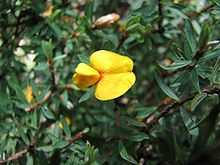Pultenaea muelleri
| Pultenaea muelleri | |
|---|---|
 | |
| Scientific classification | |
| Kingdom: | Plantae |
| (unranked): | Angiosperms |
| (unranked): | Eudicots |
| (unranked): | Rosids |
| Order: | Fabales |
| Family: | Fabaceae |
| Genus: | Pultenaea |
| Species: | P. muelleri |
| Binomial name | |
| Pultenaea muelleri Benth. | |
Pultenaea muelleri ( Mueller's Bush-pea) is a shrub which is endemic to Victoria, Australia. The species is a member of the family Fabaceae and of the genus Pultenaea. It is a dense shrub that can grow to between 1 and 3 metres in height. The leaves are 10 to 20 mm long, 1 to 2 mm wide and have parallel veins and soft hairs on the undersides.[1] The pea-shaped flowers, which are produced in terminal heads, are yellow with a red centre. These appear between October and January in the species native range.[1]
The species was first formally described by botanist George Bentham in 1864 in Flora Australiensis.[2] The specific epithet honours botanist Ferdinand von Mueller.
Pultenaea reflexifolia is a similar species that was originally described in 1940 as a Western subspecies of Pultenaea muelleri by botanist Jim Willis, based on plant material collected from Skipton, Victoria.[3]
References
- ↑ 1.0 1.1 Costermans, L. (1981). Native Trees and Shrubs of South-eastern Australia. Australia: Rigby. ISBN 072701403x.
- ↑ "Pultenaea muelleri ". Australian Plant Name Index (APNI), IBIS database. Centre for Plant Biodiversity Research, Australian Government, Canberra. Retrieved 2009-12-08.
- ↑ "Pultenaea reflexifolia". Australian Plant Name Index (APNI), IBIS database. Centre for Plant Biodiversity Research, Australian Government, Canberra. Retrieved 2013-05-19.